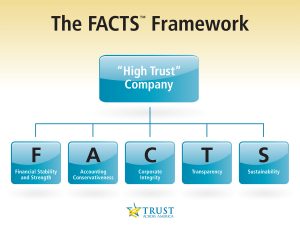According to a July 2017 World Economic Forum article about regaining trust in business….
Business is on the brink of distrust.
It is clear that the expectations of business are changing as rapidly as the world around us. Corporations must find a way to lead.
A contemporary CEO cannot afford to ignore this sentiment. The epoch of corporate social responsibility (CSR) as a cost of doing business has passed; the era of “doing well by doing good” is upon us. Balancing the profit motive with the creation of societal value is about to become a precondition for the long-term success of any corporation, sector, scale or geographic reach notwithstanding.”
(Note: Trust Across America, through it’s FACTS Framework, developed the scorecard in 2009 and has been tracking and ranking the trustworthiness of the largest 2000 US based public companies since that time.)
So what is the path forward for leaders to regain trust in business? After all, the business case for trust has been proven time and again. Perhaps it boils down to the simple question of who owns trust.
The current SOP in most companies, is to take trust for granted until there is an “issue” and then trust is “delegated” to the “right” silo depending on the nature of the problem:
- If there is a corporate crisis, the communications and legal team are there to talk about restoring trust after conferring with their PR firm.
- If it’s a matter of “ethics,” the Chief Compliance Officer steps in.
- Market share declining? The CMO steps up to tout brand “trust” in its campaign.
- High employee turnover got you down? Head to HR. After all, they must not have hired “right.” Fire the whole darn department and replace the staff with interview robots. (I kid you not)
- Unhappy shareholders? Punt to Investor Relations.
- Giving a speech about building trust in the community? The corporate responsibility and sustainability silos are right on it, once legal signs off.
Got the picture?
Unfortunately, in most companies, no single person or department owns trust and that’s why business is on the brink of distrust. It’s that simple. Imagine running a company without a Chief Financial Officer. How would the job get done? Trust can no longer afford to be treated like a hot potato.
Who should own trust?
No doubt, it’s the CEO. Trust starts at the top, as a directive from the Board, with leadership acknowledgement of its strategic importance. Once that occurs, the day-to- day practice could be delegated to a Chief Trust Officer, who reports directly to the CEO. Imagine the first company bold enough to do this. Did I just say bold? I meant smart and proactive.
What would the job entail?
- Review and refine the credo, vision and values, with buy-in from every C-Suite member (and the Board.)
- Regularly communicate vision and values to all stakeholders and ensure everyone abides by them.
- Work closely with HR so hiring (and firing) is done according to the standards set forth above.
- Get trust on the daily docket. This is an example of how one company does this, and a bit more about driving culture.
- Enforce a “zero” tolerance policy for trust breaches. Nobody is immune, especially the CEO.
What would the job requirements be?
Someone who lives the holistic concept of doing well by doing good, is a stellar communicator, and has the right combination of personal qualities to rally the troops. Impeccable character, courage, competence and consistency are key. In fact, not all that different from the qualities of a great CEO.
An organization’s chances at long-term success are predicated on the level of trust it builds with all its stakeholders. I can’t think of a more important and timely job title than Chief Trust Officer. Can you?
Barbara Brooks Kimmel is the CEO and Cofounder of Trust Across America-Trust Around the World whose mission is to help organizations build trust. She also runs the world’s largest global Trust Alliance and is the editor of the award- winning TRUST INC. book series. In 2017 she was named a Fellow of the Governance & Accountability Institute, and in 2012 she was recognized as one of “25 Women who are Changing the World” by Good Business International. She holds a BA in International Affairs from Lafayette College and an MBA from Baruch at the City University of NY.
For more information visit our website at www.trustacrossamerica.com or contact Barbara Brooks Kimmel, CEO and Cofounder
Barbara@trustacrossamerica.com
You may also join our Constant Contact mailing list for updates on our progress.
Purchase our books at this link
Copyright 2017, Next Decade, Inc.



Recent Comments